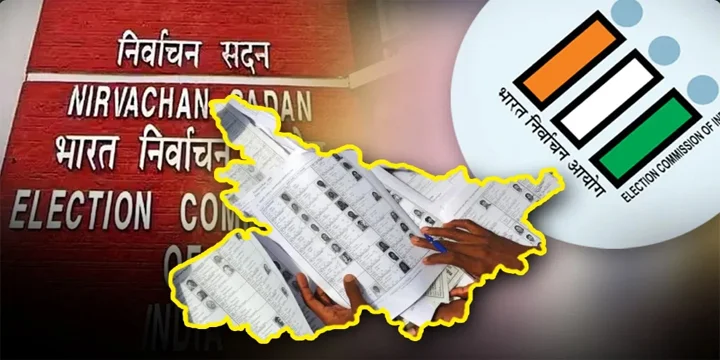
Bihar’s Special Intensive Revision (SIR) of Electoral
How Bihar’s Special Intensive Revision (SIR) of Electoral Rolls Sets a Precedent for Electoral Reform in India
CLAT Current Affairs 2026 | Editorial Breakdown by CLAT Gurukul
Why in News:
The Election Commission of India (ECI) launched a Special Intensive Revision (SIR) of the electoral rolls in Bihar, aimed at purging the voter lists of errors, duplicate entries, and illegal names. This editorial by Devesh Kumar, a BJP legislator from Bihar, provides an overview of the significance of the SIR campaign and its implications for electoral integrity, citizenship verification, and democratic participation.
The editorial is important for CLAT 2026 aspirants because it touches upon constitutional provisions (Article 324, Representation of the People Act), voter eligibility, and conflicts over illegal migration and electoral fraud, all of which are frequently tested in Legal Reasoning, Current Affairs, and Constitutional Law sections of CLAT.
Introduction:
India’s democratic success rests on free and fair elections, underpinned by the accuracy and credibility of electoral rolls. In states like Bihar, this task becomes complex due to issues like internal migration, illegal immigration, and administrative irregularities.
The Election Commission’s ongoing SIR drive in Bihar is seen as an attempt to correct systemic electoral flaws. By addressing duplicate entries, deaths, and ineligible voters, the initiative seeks to improve voter authenticity and public trust in elections. The editorial argues that this model should be replicated across India to ensure electoral reforms are not politicized but made transparent, accountable, and constitutionally valid.
Point-wise Summary for CLAT Aspirants:

- The ECI initiated a Special Intensive Revision (SIR) in Bihar to clean up the electoral rolls.
- The SIR campaign has been running for four weeks and has shown positive initial results.
- It involves Booth-Level Officers (BLOs) verifying voter data, household to household.

- 1.59% of voters were found to have died since the last election (12.5 lakh people).
- 2.2% had migrated to other states (17.5 lakh people).
- 0.73% (5.5 lakh voters) had duplicate entries in the rolls.
- In total, these errors represent millions of invalid or incorrect entries in Bihar’s 7.9 crore voter list.

- The BLOs succeeded in collecting 88.18% of enumeration forms from voters.
- This is a high success rate compared to previous campaigns.
- 83.66% of forms were collected directly from voters in the first phase of the drive.

- The ECI found several illegal migrants from Bangladesh, Nepal, and Myanmar in the voter list.
- These individuals failed to provide any valid citizenship proof, yet managed to enroll as voters.
- The editorial alleges this was a result of political manipulation by Opposition parties to create fake voter bases.

- In districts like Kishanganj, Aadhaar enrollment was 105%, raising suspicion.
- In neighbouring Araria, Aadhaar coverage was only 103%.
- The BJP claims that Rohingyas and Bangladeshis had illegally secured Aadhaar cards to vote.

- Opposition parties, including Congress and RJD, have criticized the SIR, calling it politically motivated.
- On July 10, RJD and Congress leaders held protests claiming the drive targeted minorities and Opposition vote banks.
- A petition was filed in the Supreme Court, but the Court dismissed it.

- The ECI clarified that the SIR process is constitutionally mandated:
- Article 324 gives the ECI powers of superintendence and control over elections.
- Section 21 of the Representation of the People Act (RPA), 1950 allows roll revision.
- Section 16 and 19 specify eligibility and disqualification for being an elector.

- The editorial stresses that non-citizens have no legal right to vote, and must be removed from the list.
- Failure to do so undermines electoral fairness, security, and sovereignty.

- The success of the SIR in Bihar should serve as a model for other states.
- Electoral rolls in Assam, West Bengal, Uttar Pradesh, and Maharashtra face similar challenges.

- The campaign is portrayed as a way to restore public trust in elections, particularly in border regions.
- It’s also meant to depoliticize electoral reforms, making the process evidence-based and voter-driven.
Notes: Explanation of Key Terms
Term | Explanation |
Booth-Level Officer (BLO) | A local government officer responsible for managing voter registration and electoral roll updates at polling booths. |
SIR (Special Intensive Revision) | A targeted exercise by the Election Commission to correct and revise electoral rolls, removing errors and illegal entries. |
Representation of the People Act, 1950 | The principal law governing electoral rolls, qualifications, and conduct of elections in India. |
Article 324 of Indian Constitution | Empowers the ECI to supervise, direct, and control elections in India. |
Aadhaar Mismatch | Discrepancies where the number of Aadhaar registrations exceeds the actual population, indicating possible fraud. |
Relevance for CLAT 2026:
This topic intersects with multiple areas tested in CLAT:
Section | Relevance |
Current Affairs | Electoral reforms, illegal immigration, Aadhaar, citizenship laws |
Legal Reasoning | Validity of ECI powers, legal limits on citizenship and voting |
Constitutional Law | Article 324, Article 326, RPA 1950, role of ECI |
Reading Comprehension | Editorial language, political nuance, policy critique |
Legal and Policy Dimensions:
Law/Policy | Relevance |
Representation of the People Act, 1950 | Lays down voter eligibility, roll preparation, and electoral conduct. |
Citizenship Act, 1955 | Defines Indian citizenship; critical in evaluating illegal migrants in voter rolls. |
Aadhaar Act, 2016 | Though Aadhaar is not a citizenship document, it has been used (wrongly) as voter ID proof. |
Supreme Court Judgments on Voter Roll Integrity | Courts have upheld the ECI’s authority in ensuring accurate voter rolls. |
Takeaways for CLAT Gurukul Students:
- Understand the link between citizenship and voting rights.
- Electoral rolls form the foundation of free and fair elections.
- ECI’s powers are broad and constitutionally protected, but they must be transparent and non-partisan.
- Electoral reforms like SIR can be politically sensitive, especially in states with high immigration or migration.
- Aadhaar, while useful, cannot replace citizenship proof in the electoral context.
Suggested Practice Questions for CLAT:
MCQs:
Q1. Under which Article does the ECI derive its power to conduct elections and revise electoral rolls?
A. Article 14
B. Article 324
C. Article 246
D. Article 80
Answer: B
Q2. Which section of the RPA, 1950 governs eligibility for being included in the electoral roll?
A. Section 8
B. Section 15
C. Section 19
D. Section 27
Answer: C
Q3. What was the primary objective of Bihar’s SIR campaign?
A. Increase voter turnout
B. Reduce polling stations
C. Remove duplicate/illegal entries from voter lists
D. Promote online voting
Answer: C
Conclusion:
The Special Intensive Revision (SIR) in Bihar represents a bold step toward restoring trust in India’s electoral system. With large numbers of duplicate entries, deceased individuals, and suspected illegal migrants in voter rolls, such revisions are necessary for ensuring electoral legitimacy.
For CLAT aspirants, this topic offers a rich blend of constitutional law, administrative law, and current affairs, making it an ideal case study in governance, citizenship, and rights. Understanding how institutions like the Election Commission of India function under the legal framework is crucial for both the exam and your future legal career.
This Blog is Powered by CLAT Gurukul — India’s Leading Law Entrance Prep Platform
At CLAT Gurukul, we believe in empowering future legal minds with the right blend of knowledge, strategy, and mentorship. This blog is a reflection of our commitment to quality content that not only helps aspirants stay updated but also sharpens their conceptual clarity.
Why CLAT Gurukul?
- Personalized Mentorship by Top Legal Educators
- Comprehensive Study Materials & Legal Updates
- Daily Practice Sets, Mocks & Performance Tracking
- Result-Oriented Strategy for CLAT, AILET, and CUET
Whether you’re reading this article to deepen your understanding or to stay ahead in your exam prep — you’re already one step closer with CLAT Gurukul by your side.
Join thousands of successful aspirants who trusted CLAT Gurukul and cracked India’s top law entrance exams.
Click this Video to learn more or speak to our experts now!


